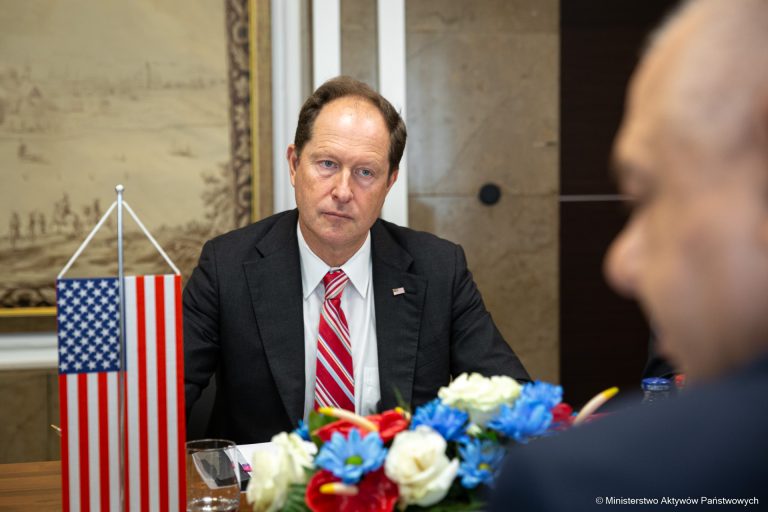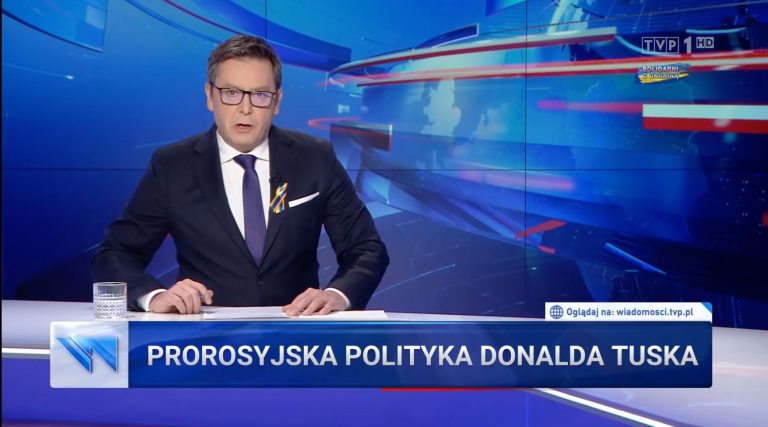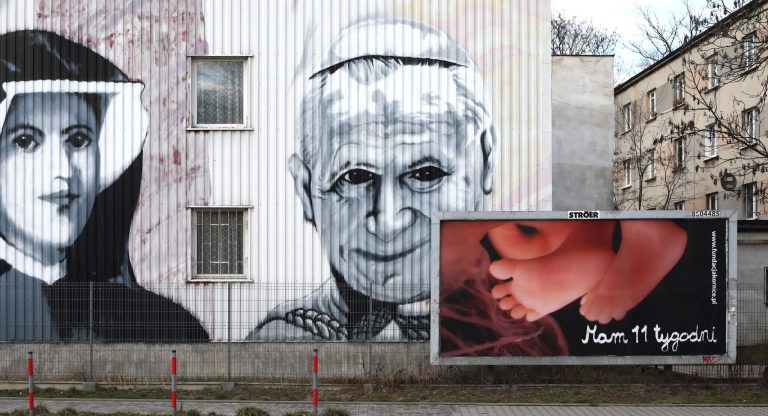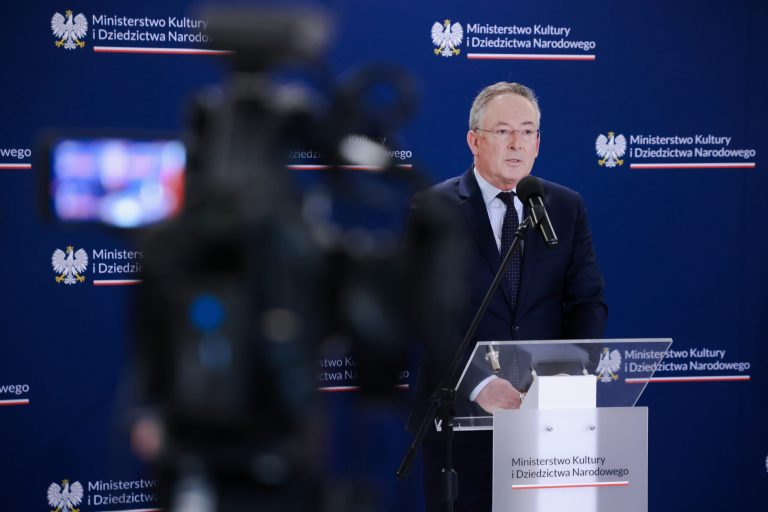Polish opposition take initiative as new parliament meets for first time
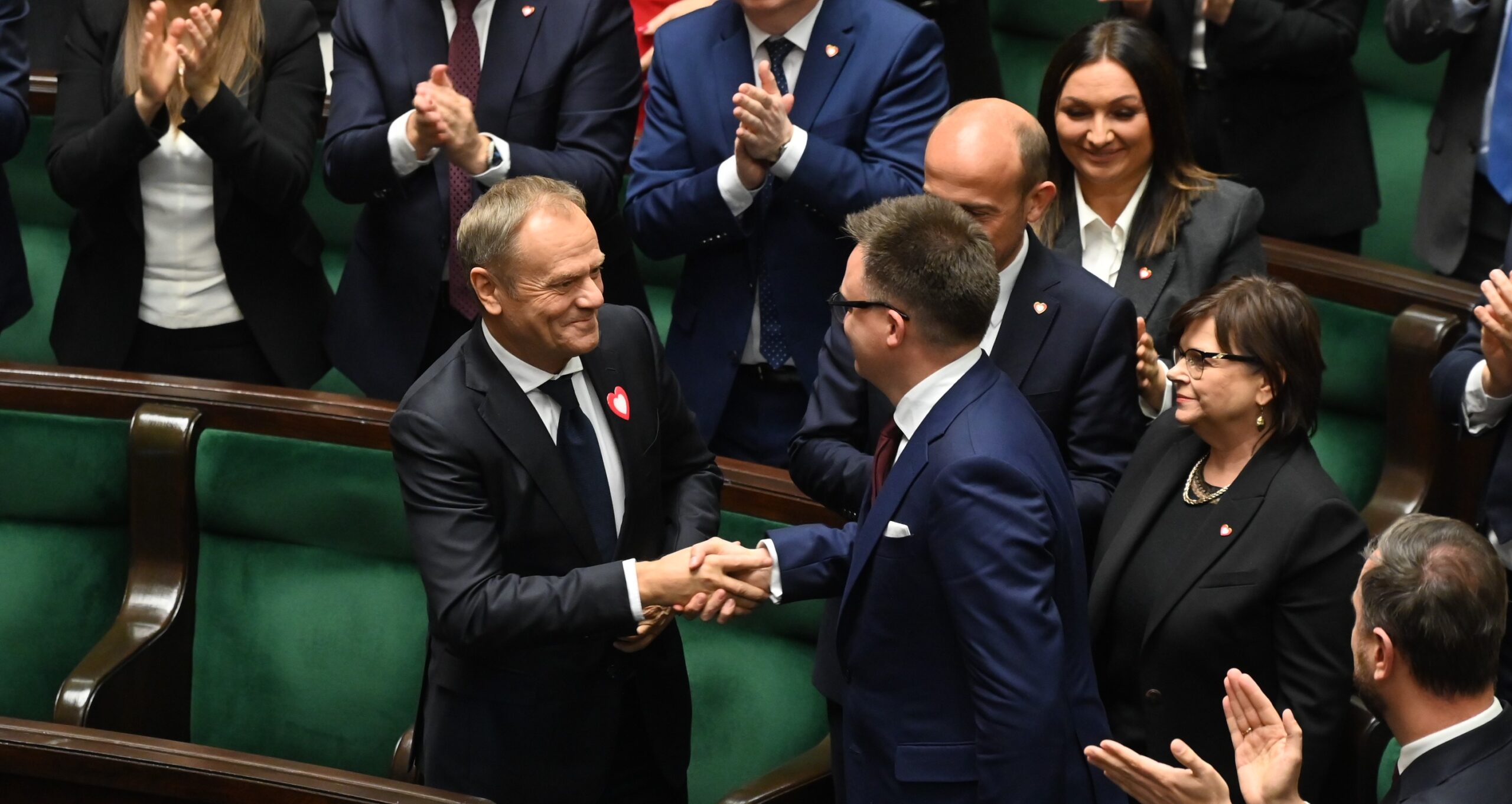
Poland’s new parliament – chosen in last month’s elections – today met for the first time. The majority now held by three opposition groups in the Sejm, the more powerful lower house, demonstrated where power now lies by electing their candidate as speaker of the house.
However, they will have to wait longer – probably until next month – before attempting to form a government after President Andrzej Duda today formally gave the national-conservative Law and Justice (PiS), which lost its parliamentary majority at the elections, the first shot at forging a ruling coalition.
President Duda has announced that he will give the ruling PiS party the first chance to form a new government.
PiS lost its majority at last month’s elections and all other groups have ruled out working with it. But it insists it can create a government https://t.co/bR6lXdh6FL
— Notes from Poland 🇵🇱 (@notesfrompoland) November 6, 2023
The new session of the Sejm opened with Duda giving an address to the chamber’s 460 MPs, 117 of them taking up a seat there for the first time. In his speech, the president – a PiS ally – made clear that he will not make life easy for the likely new government.
He described PiS’s time in power since 2015 as “a good eight years for Poland and for Poles” and pledged to “stand in defence of the most important achievements” of that period.
As president, Duda will be able to veto laws passed by parliament until the end of his current and final term in 2025. Today, he told the chamber that he “will not hesitate to use the presidential veto”. However, he also declared his “readiness to cooperate with the newly elected parliament”.
Pointing to record turnout of 74% in the 15 October elections, Duda also declared that “democracy in Poland has never been so strong. It is undoubtedly the strongest in our entire history!” That again appeared to be a rebuke towards opposition parties and their claims that PiS and Duda have undermined democracy.
Prezydent @AndrzejDuda w #Sejm: deklaruję gotowość do współpracy z nowo wybranym parlamentem; drzwi Pałacu Prezydenckiego są zawsze otwarte. pic.twitter.com/NE52y09Zu1
— Kancelaria Prezydenta (@prezydentpl) November 13, 2023
The first vote held in the new Sejm was to elect a speaker, with two candidates put forward: PiS’s Elżbieta Witek, the previous incumbent, and Szymon Hołownia of the centre-right Third Way (Trzecia Droga), one of the three opposition groups likely to soon take power.
As expected, Hołownia won comfortably, with a majority of 265 votes. Witek received 193. That means former TV presenter Hołownia has become speaker just three years after entering politics and despite having never sat in parliament until today.
Speaking to the house, Hołownia admitted that he does not know “all the tricks” of politics but added that Poles had made clear at the elections that “politics has to change”.
He pledged to lead the Sejm in the interests of the patria (Latin for “homeland”) and not the partia (Polish for “party”). That was a dig at his predecessor Witek, who is regarded by the opposition as having violated parliamentary rules in the interests of PiS.
💬Marszałek Sejmu @szymon_holownia: Polityka to nie przemoc, polityka to troska. Ta sala to nie oktagon z gali MMA. To dom spotkań i rozmowy. Najważniejsze w Sejmie stanie się znów słowo „patria”, a nie „partia”.#Sejm #Xkadencja pic.twitter.com/sZ47k0V9Dl
— Sejm RP🇵🇱 (@KancelariaSejmu) November 13, 2023
Meanwhile, in the Senate, the weaker upper house of parliament, a speaker was also chosen: Małgorzata Kidawa-Błońska of the centrist Civic Coalition (KO), the largest opposition group. The opposition have held the Senate since 2019 but increased the size of their majority at last month’s elections.
The parliamentary day ended in controversy when the Sejm was called upon to choose deputy speakers.
All opposition candidates were approved by a majority: Monika Wielichowska and Dorota Niedziela of KO; Włodzimierz Czarzasty of The Left (Lewica); Piotr Zgorzelski of Third Way; and Krzysztof Bosak of the far-right Confederation (Konfederacja).
However, PiS’s nomination of Witek as its deputy speaker was rejected by a majority of votes. Opposition parties had previously made clear that they would not accept her candidacy given her actions during her time as speaker.
„Accounting for the crimes of the previous government” is one of the elements of the coalition agreement signed on Friday by the opposition groups that will likely form the next government.
For more, see our report ⬇️ https://t.co/lwQvGGok8s
— Notes from Poland 🇵🇱 (@notesfrompoland) November 12, 2023
PiS chairman Jarosław Kaczyński told journalists that Witek was the only candidate his party would put forward and that if she was not accepted they would proceed without having a deputy speaker of the Sejm.
Kaczyński said that Witek’s candidacy had been rejected because “she is from a different world [than the opposition], a different culture, a higher one, and they are from a lower one”.
❗️- Nie będzie innego kandydata PiS na wicemarszałka Sejmu – mówi mi Jarosław Kaczyński po odrzuceniu kandydatury Elżbiety Witek.
– Ona jest z innego świata, z innej kultury. Tej wyższej. Oni są z tej niższej – Jarosław Kaczyński. @wirtualnapolska pic.twitter.com/4WxqHsTHqR
— Patryk Michalski (@patrykmichalski) November 13, 2023
This evening, Duda also formalised a decision he had made last week by appointing Mateusz Morawiecki of PiS as his candidate for prime minister, a role Morawiecki has held since 2017.
The president argued that it is traditional in Poland for the largest party after elections – in this case PiS – to be given the first chance to form a new government. The opposition have pointed out, however, that PiS is well short of a parliamentary majority and that all other parties have ruled out working with it.
Morawiecki is now tasked with forming a cabinet, proposing a programme, and then putting it to a vote of confidence in the Sejm. Should he fail to secure a majority – as appears almost certain – the Sejm itself will put forward an alternative candidate for prime minister.
That is likely to be Donald Tusk, who the trio of opposition groups – his KO, Third Way and The Left (Lewica) – have already named as the man they want to lead the new government, which is set to take power next month at the latest.
We answer 12 questions about Poland’s new government, including:
1. How will it be formed?
2. Will it be stable?
3. How will it tackle rule of law and abortion?
4. Can it unlock EU funds?
5. Will it face presidential vetoes?
Read our full analysis here⬇️https://t.co/oLK33waftV
— Notes from Poland 🇵🇱 (@notesfrompoland) October 23, 2023
Notes from Poland is run by a small editorial team and published by an independent, non-profit foundation that is funded through donations from our readers. We cannot do what we do without your support.
Main image credit: Kancelaria Sejmu/Twitter

Daniel Tilles is editor-in-chief of Notes from Poland. He has written on Polish affairs for a wide range of publications, including Foreign Policy, POLITICO Europe, EUobserver and Dziennik Gazeta Prawna.

